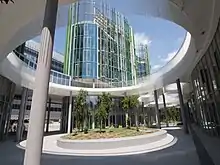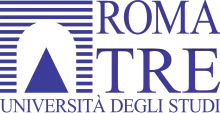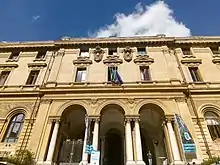Roma Tre University
Roma Tre University[6] (Italian: Università degli Studi Roma Tre) is an Italian public research university in Rome, Italy, with its main campus in the Ostiense quarter.
Università degli Studi Roma Tre | |
 | |
| Type | Public |
|---|---|
| Established | 1992 |
| Endowment | € 263.8 million (2012)[1] |
| Rector | Massimiliano Fiorucci |
Administrative staff | 1,370 |
| Students | 35,338[2] |
| Location | , Italy[3] 41°51′43″N 12°28′47″E |
| Campus | Urban |
| Colors | Blue[4] |
| Nickname | Levrieri |
Sporting affiliations | R3 Sport[5] |
| Mascot | Levriero Italiano |
| Website | www |
 | |
Founded in 1992 by the Ministry of Public Education, under the request of several professors of the Sapienza University of Rome, it was the third public university to be established in the metropolitan area of Rome. It is the second-largest university of Rome by enrollment and one of the largest research-based institutions in the country.
History
The idea of founding a third university in Rome was flagged in the middle 1980s when the Ministry of Public Education formed a committee of inquiry into higher education to deal with a perceived emergency in university enrollments in Rome. After much debate, a future campus location was selected in what was a semi-industrial part of the city and it was decided that the future university be named with a number in chronological order. Roma Tre University, was formally established in 1992 under the name Terza Università degli Studi di Roma (Third University of Rome). One of the milestones for Roma Tre, since its foundation, as well as a guideline for its development, was its incorporation in the surrounding area, characterised by the reclamation of old buildings and school premises, transformed into facilities for study and research.
Pope Francis visited the university, Rome's youngest, on February 17, 2017.[7]
Organization and administration
The university comprises 8 schools and 12 departments, enrolling 35,338 students[2] and having 1,370 academic and professional staff. At present, the university offers 54 undergraduate degree programs, 75 master's degree programs, 16 doctoral schools and five PhD programs.
The Rector, the Vice Rector, the Academic Senate and the Board of Governors are the main governing bodies of the university, which are responsible for setting university policy and development strategy. The statute also provides for a University Executive Committee, the students' representative council, the Council of Faculty Deans and a University Ombudsman.
The Rector is the official representative of the university. As well as calling and chairing meetings of the Academic Senate, the Board of Governors and the University Executive Committee, the Rector supervises the university's teaching, scientific and service structures, and gives appropriate guidance. The Rector also acts as ombudsman for the teaching and research autonomy of academic staff. The current Rector is Prof. Massimiliano Fiorucci.
Double degree agreements
The university has double degree agreements with:
- University of Murcia (Law)
- University of Poitiers (Law)
- Nova Southeastern University (Law)
International agreements
Roma Tre University holds a number of academic cooperation agreements with foreign universities, promoting professors, researchers and students mobility and exchange.
The global partnerships include the University of Brasilia, the École Polytechnique Fédérale de Lausanne, the University of Passo Fundo, the University of Talca, the University of Valparaíso.
International networks
Roma Tre University takes part into a series of international university networks that share the task of promoting cooperative activities in diverse fields and seek to create a European area of communal higher education.
The association groups and networks of which Roma Tre University is a member are:
- European Network of Universities for the Implementation of the European Landscape Convention
- European University Association
- Institutional Network of the Universities from the Capitals of Europe
- Mediterranean Universities Union
Academics
Admission
Admission to the university is restricted and competitive. Every School offers a limited number of places for each program, and admissions are regulated by an entrance examination delivered by the University Admissions Committee.
- The School of Architecture admits 180 students each year.
- The School of Law admits 1,000 students each year.[8]
Schools

The primary objective of the 8 schools of Roma Tre University is to define, organise and connect the academic activities of the degree courses:
- School of Architecture (Facoltà di Architettura) - The School of Architecture[9] offers undergraduate degree and master's degree qualifications. The school has a network of exchange programs with the European Union, Middle East, United States and Eastern European universities. The School is constantly ranked in the top three of the country.
- Federico Caffè School of Economics (Facoltà di Economia "Federico Caffè") - The Federico Caffè School of Economics[10] has set up exchange programs with other foreign universities and also agreements with national and international companies and institutions to enable its students to have a first contact with the job market during their studies. Graduates can choose different careers: managerial positions in financial, management, consulting and auditing firms or banking group, in non-profit organizations and academic or professional careers in universities or research-oriented organizations.
- School of Education Sciences[11]
- School of Engineering (Facoltà di Ingegneria)[12]
- School of Law (Facoltà di Giurisprudenza) - The School of Law[13] is located in via Ostiense in the Ostiense quarter just in front of the Basilica of Saint Paul Outside the Walls. It is constantly ranked between the third and the fifth place among over 60 Italian law schools.[14] The School hosts the only Clinical Legal Program in Rome. The Clinic focuses primarily on human rights, immigration and refugee law.
- School of Literature and Philosophy (Facoltà di Lettere e Filosofia) - The School of Literature and Philosophy[15] offers traditional subjects such as Literature, Philosophy, History, Classical Studies, Archeology as well as new courses like History of Art, Music and Performing Arts. The School is located in via Ostiense.
- School of Mathematical, Physical and Natural Sciences - The School of Mathematical, Physical and Natural Sciences[16] comprises different scientific and research areas spanning from mathematics to chemistry, from physics to information science, from geology to biology and biotechnology, from natural sciences to astronomy, from the environmental science to conservation and restoration of the cultural heritage.
- School of Political Sciences (Facoltà di Scienze Politiche)[17]
- Astre School of Advanced Studies[18] was the university superior graduate school for particularly motivated students. Roma Tre University has established, among the others, an exchange agreement within the school's program with the University of California, Berkeley.
Research centers
- Center for Italian and French Studies - The Center for Italian and French Studies[19] is located in the 16th-century Palazzo Capizucchi, the chapel of which is today the center's Conference Room. The Center runs the Guillaume Apollinaire Library; it coordinates and hosts research and consultation activities through contracts and agreements signed with institutions, Italian and French public and private bodies, as well as with European Union bodies. It sets up databases, bibliographical and documentation services which are available on line; it publishes in its own library series the specialised material resulting from the research carried out within the framework of the centre's activities. Is organises congresses, conferences, seminars for students -undergraduates and PhD-as well as for external participants.
- La Faggeta Research Center - The La Faggeta Research Center is located in the town of Allumiere.
- Altiero Spinelli Center of Excellence - The center is part of the Jean Monnet Programme.
- Giovanni Pugliese Center of Excellence in European Law
- Interdepartmental Research Center for American Studies[20]
- Interdepartmental Research Center for Education and Social Studies[21]
- Interdepartmental Research Center for Evolutionary Ecology[22]
- Interdepartmental Research Center for Institutional Economics[23]
- Interdepartmental Research Center for Irish and Scottish Studies[24]
- Giorgio Recchia Interdepartmental Research Center for Political, Constitutional and Comparative Law Studies[25]
- Interdepartmental Research Center for Somali Studies[26]
Other facilities
- Museum of Zoology and Comparative Anatomy - The Museum of Zoology and Comparative Anatomy[27] is a laboratory which supports both scientific research and education in Animal Biology. The major role of the museum is to conserve and exhibit zoological material to students, PhD and researchers.
- Palladium Theatre - The Palladium Theatre[28] is the university theatre. It was built between 1927 and 1929 by the architect Sabbatini and was completely renovated by the university.
- Roma Tre Farm - The farm is in a 24-acre (97,000 m2) villa dating back to the 16th century in the town of Ciampino. The university supports a Sustainable Food Project.
Rankings
Roma Tre University is ranked:
- 570 out of 20.300 universities in the World Rank of the Webometrics Ranking of World Universities;[29]
- 392 out of 11.000 universities in the World Web Ranking of 4ICU - International Colleges & Universities;
- 858 out of 3.042 universities in the Global Ranking of the SCImago Institutions Rankings;
- 698 out of 2.500 universities in the World Ranking of the University Ranking by Academic Performance.[30]
The School of Economics is ranked in the top 25% institutions in Italy in the RePEc ranking.[31]
The School of Law is constantly ranked among the top-five in the country with a note of AAA (Censis-La Repubblica), mostly due to the selective entry test and to the small-size of the classes.
Student life
Student life at the university does not merely revolve around lectures and exams, as there is a diverse array of student activities. There are many student organisations organizing student exchange programmes throughout Europe.
Students elect their representatives (Student Vice-Dean and the Student Parliament) to coordinate various student activities, represent their interests in the Faculty bodies, participate in the evaluation of studies and the faculty, and secure the involvement and participation of students in all matters and issues of interest to them.
- Contribution to the arts - Roma Tre hosts the annual Roma Tre Film Festival at the Palladium Theatre.
- Roma Tre News - Roma Tre News[32] is the student newspaper of the university. It is run entirely by undergraduate and graduate students. Many alumni have gone on to careers in journalism.
Traditions
Every year, during the academic year opening ceremony, a distinguished public figure is invited to address the students with a lecture on a current global issue. Since the university foundation, there have been 5 Heads of state speaking at the ceremony. Past speakers include Antonio Ruberti, the ninth President of Italy Oscar Luigi Scalfaro, the 49th Prime Minister of Italy Carlo Azeglio Ciampi, Leah Rabin, Shirin Ebadi, the member of the executive board of the European Central Bank Tommaso Padoa-Schioppa, the seventh European Commissioner for Research, Innovation and Science Philippe Busquin, the 264th Pope John Paul II, Kerry Kennedy, Marco Travaglio, the sixth President of the European Parliament Josep Borrell Fontelles, the 34th President of Chile Michelle Bachelet, the 11th President of Italy Giorgio Napolitano, the 52nd Prime Minister of Italy Romano Prodi.
Notable alumni and faculty
Notable alumni include: Andrea Alù, Alessandro Di Battista, Joseph Pace, Marco Lo Muscio, Raffaele Monti, Virginia Raggi, and Cinzia Giorgio. Among the prominent scholars who have taught at Roma Tre University include Pier Luigi Luisi, Pierangelo Garegnani, Paolo Leon Andrea Riccardi, Luciano del Castillo, Giuseppe Conte, Giorgio Melchiori, Giacomo Marramao, Mario De Caro, Roberto Cipriani, Vittorio Cotesta, Amos Luzzatto, and Federico Schiano di Pepe.
References
- "Roma Tre University – Financial Resources".
- "Osservatorio - Didattica studenti" sul sito del MIUR
- CIA (2008). "Appendix B. International Organizations and Groups". World Factbook. Archived from the original on June 13, 2007. Retrieved 10 April 2008.
- "Roma Tre University – Identity Guidelines".
- "R3 Sport".
- Uniroma3.it.
- "Visita all'Università degli Studi Roma Tre".
- "Number of places available - School of Law".
- "School of Architecture". Archived from the original on 2012-01-26.
- "Federico Caffè School of Economics".
- "School of Education Sciences". Archived from the original on 2012-09-02.
- "School of Engineering".
- "School of Law".
- "School of Law: an institutional overview".
- "School of Literature and Philosophy".
- "School of Mathematical, Physical and Natural Sciences". Archived from the original on 2012-03-10.
- "School of Political Sciences".
- "Astre School of Advanced Studies".
- "Center for Italian and French Studies".
- "Interdepartmental Research Center for American Studies. Home page".
- "Interdepartmental Research Center for Education and Social Studies. Home page".
- "Interdepartmental Research Center for Evolutionary Ecology. Home page".
- "Interdepartmental Research Center for Institutional Economics homepgae".
- "Interdepartmental Research Center for Irish and Scottish Studies. Home page".
- "Interdepartmental Research Center for Political, Constitutional and Comparative Law Studies "Giorgio Recchia". Home page".
- "Interdepartmental Research Center for Somali Studies. Home page".
- "Museum of Zoology and Comparative Anatomy. Home page".
- "Palladium Theatre. Home page".
- "Webometrics Ranking of World Universities".
- "University Ranking by Academic Performance".
- "Ideas Ranking".
- "Roma Tre News".